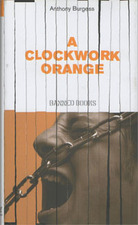Review: ‘A Clockwork Orange’ by Anthony Burgess
Author: Anthony Burgess
Published: William Heinemann Ltd. for the Independent’s Banned Books series, 2007, pp. 158
Genre: Dystopian fiction
Blurb: It’s the near future. In an unnamed city (London? Berlin? Prague?) Alex and his teenage droogs are on the prowl, spending their evenings looking for ultra-violence, rape, even murder. There’s a price to be paid, though, when Alex is jailed and subjected to the chilling Ludovico Technique that will turn him into a good citizen. But is it morally right to deprive someone of his capacity for evil?
Told with breathtaking economy, written in the bravura Anglo-Russian slang called Nadsat, Anthony Burgess’ dazzling study of violence and human choice is as fresh and relevant today as when it first appeared in 1962.
Where, when and why: I got this book free with the Independent (or technically, I got the Independent free with this book as that’s the only reason I bought the paper) when they were promoting their Banned Books series back in 2007. This book has been on the shelf for far too long and I got the feeling that it’s the type of book that would do nasty, violent things to me if I didn’t obey its wishes and read it right now. It also counts towards my Books off the Shelf Challenge
What I thought: When I started this book, I thought I was going to hate it, neither casual violence nor slang ever having held any appeal for me. By the time I finished it, I still didn’t like it, but I could appreciate it. What Anthony Burgess does in this novella is clever and insightful and, like my last read, it is a book with an Idea. It is impossible to discuss the book and the Idea without giving some of the plot away though, so you have been warned.
The Idea in A Clockwork Orange is about the problem of free will. The Ludovico Technique takes away Alex’s ability to react in a violent or negative manner towards anyone. Even contemplating the hideous acts in which he would happily engage at the beginning of the story cause him to be physically sick. The process and the results are undeniably barbaric and inhumane, and impossible to support. It reminded me a little of Brave New World in that what should be an ideal situation in which everyone is happy and no one causes harm appears to the reader as a dystopia because there is no free will. It’s the same reason that readers will always get behind Satan in Paradise Lost: we will always choose the right to be wrong and unhappy and violent over not having the freedom to choose.
What puts the reader in so awkward a position in this book is that Alex is so undeniably evil prior to the Ludovico Technique; there are no mitigating factors to any of his actions. He has both parents and a stable home life, so can’t claim the usual get out clause of an unhappy childhood. He doesn’t steal because he needs the money — in fact, Burgess explicitly states that Alex and his gang deliberately spend their money to give them an excuse to go and rob a shop — he does it because he enjoys it. Perhaps the most chilling moment in the book is when Alex admits simply:
But what I do I do because I like to do (p. 38)
I found myself wincing whenever he encountered another character because I knew something awful was going to happen. As the prison chaplain debates to himself:
What does God want? Does God want Goodness or the choice of goodness? Is a man who chooses the bad perhaps in some way better than a man who has the good imposed upon him? (p. 81)
That is the question this book asks, and there is no comfortable answer.
Moving on to less philosophical musings, I want to address the two things that I thought I would dislike about A Clockwork Orange: the slang and the violence. Much of the book is written in nadsat, an English-Russian hybrid slang language. My copy of the book had a handy glossary in the back and for the first page I looked up every single word. However, I very quickly found that the language was perfectly understandable from context and repetition, and I very rarely needed to refer to the word list. Far from being a distraction, it added to the sense of Alex’s world and I enjoyed its effect. The violence was more of an issue, and is the main reason why I still don’t like this book in spite of its cleverness. Yet there wasn’t nearly as much as I was expecting, nor was it very graphic. In fact, the violence was appropriate and effective. Yes, it is horrible, particularly when it is described so casually and Alex and his gang take such glee in it, but Burgess has to show how unpleasant Alex is in order for the Ludovico Technique to be an effective plot device.
Ignore any prejudices you may have about this book and you will find that, underneath the expectations of slang and violence, there is an intelligent story with a surprisingly erudite and expressive anti-hero.
Where this book goes: When I started this book, I felt sure I would be getting rid of it as soon as I was done with it. However, I think I’m going to keep it on my shelves even though I found it quite unpleasant, because it has some interesting things to say and it isn’t the torture porn book I had been expecting. I’m pretty sure that nothing could ever persuade me to watch the Stanley Kubrick film adaptation though.
Tea talk: After reading this book I felt I needed a pot of real strong horrorshow chai (p. 35) as Alex puts it, so I counteracted the disconcerting nature of this book with a reassuring pot of English Breakfast tea. This particular packet of leaves was brought for me by some friends when they went to Clifford’s Tower in York. I’m not sure what that has to do with tea either, but there you go.
5 Responses to “Review: ‘A Clockwork Orange’ by Anthony Burgess”
Comment from letovanje 2011
Time November 12, 2010 at 2:47 am
Without difficulty, the post is really the best on this worthy topic. I agree with your ideas and will thirstily look ahead to your approaching updates. Saying thanks will not just be enough, for the tremendous quality in your writing. I will promptly pick up your rss feed to stay privy of any updates. Excellent work and a lot success in your potential!
Comment from oldenglishrose
Time November 13, 2010 at 4:53 pm
Thank you so much for the compliment. I try to write honest reviews, so I hope you will stay around to read them.
Comment from Stacey
Time January 10, 2011 at 1:58 am
Hello. I have just come across your blog and am making my way through your archives and am enjoying your reviews. Just a comment re the violence in A Clockwork Orange…the book was originally published in the early 60s I believe and the violence would have seemed very graphic for that time. I never read the book, but did go to see the film version in 1971 and to this date it is the only film I ever walked out of! I happened to catch it on TV recently and watched a bit of it and was amazed by how mild it all seemed compared to what happens both in movies and books these days. What is frightening to me is that then the reality of someone choosing to exercise their will in such vile ways seemed rare and now they seem all too common. (I am writing this the day after a gunman shot and killed 5 people and wounded an Arizona congresswoman!) The joy of free will is we can choose to do good and I choose to do that. May you be blessed with happy reading trails.
Comment from oldenglishrose
Time January 12, 2011 at 10:09 am
Thank you for leaving me such a thoughtful comment. It’s sad that graphic violence has become so commonplace in film, literature and the news and you’re right, perhaps I would have been more shocked by it had I read it when it was first published. Violence both in and out of literature is of course terrible, but I did appreciate the questions that this book raised about whether anything can ever be done about that.


Pingback from ‘Crash’ by J. G. Ballard « A Life of Books and Tea
Time September 30, 2010 at 11:29 pm
[...] book and not an enjoyable read at all. This was what I was expecting, but then I started reading A Clockwork Orange with the same preconceptions but was brought round by the impressive writing and message. Crash [...]